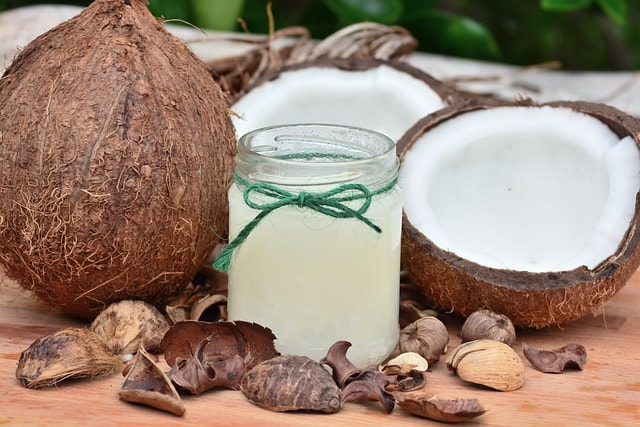Premium Virgin Coconut Oil
Coconut oil has gained popularity for its potential health benefits and versatility. Here are some of the commonly attributed benefits of coconut oil:
- Promotes skin and hair health: Coconut oil is often used in skincare and hair care products due to its moisturizing properties. It can help improve the skin's hydration and barrier function, making it smoother and more supple. It may also aid in reducing hair damage and promoting healthier hair growth.
- Supports heart health: While coconut oil is high in saturated fats, it consists mainly of medium-chain triglycerides (MCTs). MCTs are processed differently by the body compared to long-chain triglycerides (LCTs) found in most other fats. Some studies suggest that MCTs may increase "good" HDL cholesterol levels and have a neutral or positive effect on other heart disease risk factors.
- Aids in weight management: The MCTs in coconut oil are believed to have potential benefits for weight management. They can be quickly converted into energy by the liver and are less likely to be stored as fat. Some research suggests that including coconut oil in a balanced diet may increase feelings of fullness and boost calorie burning.
- Contains beneficial fatty acids: Coconut oil is rich in lauric acid, a medium-chain fatty acid known for its antimicrobial properties. Lauric acid can help fight certain bacteria, viruses, and fungi, supporting immune system function and overall health.
- Supports brain function: MCTs, such as those found in coconut oil, can be converted into ketones, which serve as an alternative energy source for the brain. This has led to speculation that coconut oil could potentially benefit individuals with certain neurological conditions, although more research is needed to fully understand its effects.
- May have anti-inflammatory properties: Some studies suggest that coconut oil may possess anti-inflammatory properties. However, further research is needed to determine the extent and mechanisms of its anti-inflammatory effects.
Personal uses:
Coconut oil is an edible oil extracted from the kernel or meat of matured coconuts harvested from the coconut palm (Cocos nucifera). It has various applications in food, medicine, and industry. Because of its high saturated fat content it is slow to oxidize and, thus, resistant to rancidification, lasting up to two years without spoiling.
Coconut oil has numerous benefits for both hair and skin. It is nutritious for all hair types, helping hair to shine, softening hair, remedying damaged hair by helping to preserve the hair's natural proteins[1] and can even provide relief from dandruff.[2] For the skin, coconut oil is an excellent moisturiser for all skin types, and especially for dry and older skin. lauric acid in coconut oil has both anti-bacterial and anti-fungal properties.[3]
If you're not already using coconut oil in your beauty routine, it's worth trying it––it's inexpensive and you'll most likely love the results.
Hair
1. Apply the coconut oil directly onto your scalp. If you live in an arid climate, consider lightly misting your hair with water first.
2. Massage hair from hair roots to ends.
3. Leave on for at least 30 minutes before washing. For best results, leave on for as long as you can and apply at least three times a week.
4. For deeper penetration, apply directly onto your scalp, massaging from roots to ends before bedtime. Then leave on overnight (cover your head with a cap or towel, or lay a towel across your pillow). Shampoo and rinse well in the morning.
Hair Tips
- Coconut oil is around 90 percent effective at getting rid of head lice when rubbed into the scalp.
- A small amount of this oil goes a long way. If you have fine hair, be careful not to use too much; hair may become greasy and stringy.
- Do not leave the oil on the hair for more than a day without washing it. Depending on hair-type, if left on for too long, the oil may lose its pleasant smell, and make your hair become greasy.
- If you color your hair at home, coconut oil can be used to help reduce the damage from the chemicals by adding moisture. Apply a couple drops in your dye bottle mix it well before using.
- Any kind of coconut oils are good. However, extra virgin oil is best for soft silky hair because of its natural form, and no loss of properties.
- For a deeper conditioning treatment, leave oil on the hair whilst in a steamy bath. Alternatively, after application, put on a shower cap, and use a blow dryer on it for 15 minutes.
Skin
Used as a moisturiser, a university study concluded that coconut oil is safe and effective.[4]
- Apply a thin layer of oil over your body after bathing or showering. Several thin layers of oil are absorbed much better than one thick layer because too much oil in any one place saturates the tissues and limits absorption.
- Add to the bath. You may also drop some coconut oil in your bath water while taking a bath.
- Use as a massage oil. Coconut is a lovely oil for massaging, leaving a faint odour of coconut wafting about as you massage. It can be applied all over, although if you want an instant stress reliever, try massaging just your temples with a little of it.
Sources

